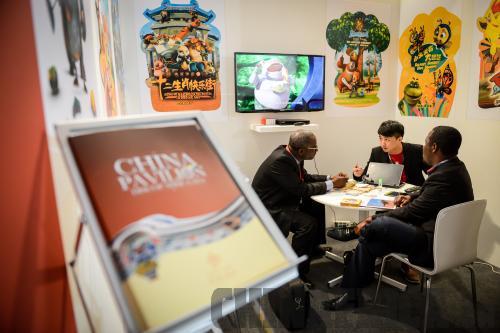| 
Africans use Chinese language skills in all walks of life
Perhaps one aspect of Sino-African cultural engagement that has long-term implications for the relationship is language and education. From breaking down cultural barriers to understanding each other, language is the golden thread that portends great opportunities for Sino-African friendship and solidarity.
Like with other Sino-African phenomena, there is often an erroneous supposition that engagement in the language field kicked off only after 2000. Sino-African specialists are quick to point out that the educational links date back to the early 1960s.
The educational dimension meant a large number of African students won scholarships to study in China, thus acquiring Chinese language skills.
Admittedly however, it is after 2000 that the educational exchanges between African countries and China had a dramatic impact on the uptake of the Chinese language on the continent. The spread of interest in the Chinese language in Africa or by Africans is based on the huge appetite for Chinese language and culture studies. The motivation is that China is today Africa's number one economic partner and therefore, it is necessary to know the Chinese language and culture to facilitate negotiations and transactions at personal, social, corporate and governmental levels.
Two ways in which education has led to a rise in Chinese language skills in Africa stand out: through the 6,000-plus scholarships given to African students on the one hand and via Confucius classrooms and Confucius institutes on the other hand. Beyond these principle and structured means, numerous other informal Chinese language-acquisition avenues exist. For instance, African entrepreneurs plying their trade in Chinese manufacturing hubs in Guangzhou (Guangdong Province), Yiwu (Zhejiang Province) and Hong Kong get to speak Chinese by trial and error; the Chinese language rubs off on Africans working on Chinese-funded projects in Africa; Africans working in China, say for diplomatic missions or international organizations, find it worthwhile learning the language.
Let us take the case of Chinese language learning at an Africa-based Chinese company. Finding themselves at a construction site, Chinese workers and their African counterparts are constrained to break the language barrier by learning each other's language. With time, they end up with a good degree of vocabulary from one another.
The Confucius institutes and classrooms are the biggest avenue for learning Chinese, even more than Chinese scholarships. The first Confucius Classroom was established at the Stellenbosch University in South Africa in 2004, ultimately leading to the establishment of the pioneering Center for Chinese Studies at the same university in partnership with south China's Xiamen University. In 2005, the first full-fledged Confucius Institute was opened at the University of Nairobi in partnership with the Tianjin Normal University. It is noteworthy that this trailblazing African Confucius Institute opened only a year after the first global one was established in Uzbekistan in 2004. Since then, the number of Confucius institutes in Africa has risen dramatically to about 40 while Confucius classrooms stand at around 10, according to the Beijing-based Confucius Institute Headquarters.
A new trend gaining traction in Africa is one whereby Chinese teachers are going to Africa to teach Chinese in primary and tertiary institutions. These teachers are often volunteers who are given some basic pre-departure training before leaving for schools in both urban and rural Africa. In fact it would appear that the volunteer Chinese language teaching program has dovetailed with the Confucius institutes to spur the development of the Chinese language in a growing number of African countries. As it is, Chinese will soon be offered as a foreign language in a number of African countries, just as the French option in Anglophone Africa, or English in Francophone Africa.
While Chinese can draw Africans keen to acquire a second or third foreign language for their own sake, pragmatism is often the motivation. Many an African government wants to increase the number of officials with Chinese language literacy to help with oral and written translation. A rising number of African diplomatic missions in China now require that certain levels of staff must have Chinese language skills. All these are appreciable, what with the frequency with which African governments have to negotiate for loans, seek aid and collaborate with China bilaterally and multilaterally. It has been a cause for concern that African officials lacked Chinese language skills while their Chinese counterparts were often comfortable speaking French, English, Spanish, Portuguese, Arabic and Swahili, six of the key official languages on the continent.
While Chinese has taken pole position as a language of demand on the continent, it is also true that this demand is far from reaching its peak. As long as China remains Africa's largest economic partner, demand for Chinese language skills for pragmatic purposes, such as aiding recent graduates in their job hunt, will increase. Indeed, it can be expected that Chinese will be a huge draw as proactive African governments roll out Chinese language curriculums for primary and secondary schools.
(The writer is a research associate at the University of the Witwatersrand)
|